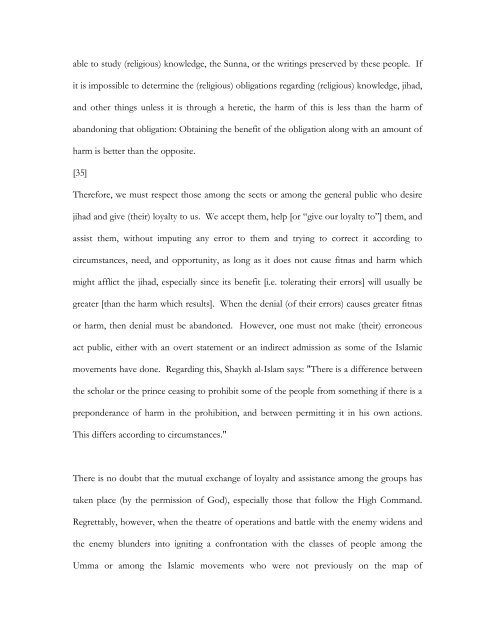abu-bakr-naji-the-management-of-savagery-the-most-critical-stage-through-which-the-umma-will-pass
abu-bakr-naji-the-management-of-savagery-the-most-critical-stage-through-which-the-umma-will-pass
abu-bakr-naji-the-management-of-savagery-the-most-critical-stage-through-which-the-umma-will-pass
You also want an ePaper? Increase the reach of your titles
YUMPU automatically turns print PDFs into web optimized ePapers that Google loves.
able to study (religious) knowledge, <strong>the</strong> Sunna, or <strong>the</strong> writings preserved by <strong>the</strong>se people. If<br />
it is impossible to determine <strong>the</strong> (religious) obligations regarding (religious) knowledge, jihad,<br />
and o<strong>the</strong>r things unless it is <strong>through</strong> a heretic, <strong>the</strong> harm <strong>of</strong> this is less than <strong>the</strong> harm <strong>of</strong><br />
abandoning that obligation: Obtaining <strong>the</strong> benefit <strong>of</strong> <strong>the</strong> obligation along with an amount <strong>of</strong><br />
harm is better than <strong>the</strong> opposite.<br />
[35]<br />
Therefore, we must respect those among <strong>the</strong> sects or among <strong>the</strong> general public who desire<br />
jihad and give (<strong>the</strong>ir) loyalty to us. We accept <strong>the</strong>m, help [or “give our loyalty to”] <strong>the</strong>m, and<br />
assist <strong>the</strong>m, without imputing any error to <strong>the</strong>m and trying to correct it according to<br />
circumstances, need, and opportunity, as long as it does not cause fitnas and harm <strong>which</strong><br />
might afflict <strong>the</strong> jihad, especially since its benefit [i.e. tolerating <strong>the</strong>ir errors] <strong>will</strong> usually be<br />
greater [than <strong>the</strong> harm <strong>which</strong> results]. When <strong>the</strong> denial (<strong>of</strong> <strong>the</strong>ir errors) causes greater fitnas<br />
or harm, <strong>the</strong>n denial must be abandoned. However, one must not make (<strong>the</strong>ir) erroneous<br />
act public, ei<strong>the</strong>r with an overt statement or an indirect admission as some <strong>of</strong> <strong>the</strong> Islamic<br />
movements have done. Regarding this, Shaykh al-Islam says: "There is a difference between<br />
<strong>the</strong> scholar or <strong>the</strong> prince ceasing to prohibit some <strong>of</strong> <strong>the</strong> people from something if <strong>the</strong>re is a<br />
preponderance <strong>of</strong> harm in <strong>the</strong> prohibition, and between permitting it in his own actions.<br />
This differs according to circumstances."<br />
There is no doubt that <strong>the</strong> mutual exchange <strong>of</strong> loyalty and assistance among <strong>the</strong> groups has<br />
taken place (by <strong>the</strong> permission <strong>of</strong> God), especially those that follow <strong>the</strong> High Command.<br />
Regrettably, however, when <strong>the</strong> <strong>the</strong>atre <strong>of</strong> operations and battle with <strong>the</strong> enemy widens and<br />
<strong>the</strong> enemy blunders into igniting a confrontation with <strong>the</strong> classes <strong>of</strong> people among <strong>the</strong><br />
Umma or among <strong>the</strong> Islamic movements who were not previously on <strong>the</strong> map <strong>of</strong>


